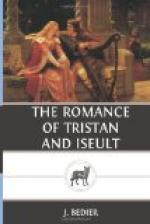The summer passed and the winter came: the two lovers lived, all hidden in the hollow of a rock, and on the frozen earth the cold crisped their couch with dead leaves. In the strength of their love neither one nor the other felt these mortal things. But when the open skies had come back with the springtime, they built a hut of green branches under the great trees. Tristan had known, ever since his childhood, that art by which a man may sing the song of birds in the woods, and at his fancy, he would call as call the thrush, the blackbird and the nightingale, and all winged things; and sometimes in reply very many birds would come on to the branches of his hut and sing their song full-throated in the new light.
The lovers had ceased to wander through the forest, for none of the barons ran the risk of their pursuit knowing well that Tristan would have hanged them to the branches of a tree. One day, however, one of the four traitors, Guenelon, whom God blast! drawn by the heat of the hunt, dared enter the Morois. And that morning, on the forest edge in a ravine, Gorvenal, having unsaddled his horse, had let him graze on the new grass, while far off in their hut Tristan held the Queen, and they slept. Then suddenly Gorvenal heard the cry of the pack; the hounds pursued a deer, which fell into that ravine. And far on the heath the hunter showed — and Gorvenal knew him for the man whom his master hated above all. Alone, with bloody spurs, and striking his horse’s mane, he galloped on; but Gorvenal watched him from ambush: he came fast, he would return more slowly. He passed and Gorvenal leapt from his ambush and seized the rein and, suddenly, remembering all the wrong that man had done, hewed him to death and carried off his head in his hands. And when the hunters found the body, as they followed, they thought Tristan came after and they fled in fear of death, and thereafter no man hunted in that wood. And far off, in the hut upon their couch of leaves, slept Tristan and the Queen.
There came Gorvenal, noiseless, the dead man’s head in his hands that he might lift his master’s heart at his awakening. He hung it by its hair outside the hut, and the leaves garlanded it about. Tristan woke and saw it, half hidden in the leaves, and staring at him as he gazed, and he became afraid. But Gorvenal said: “Fear not, he is dead. I killed him with this sword.”
Then Tristan was glad, and henceforward from that day no one dared enter the wild wood, for terror guarded it and the lovers were lords of it all: and then it was that Tristan fashioned his bow “Failnaught” which struck home always, man or beast, whatever it aimed at.
My lords, upon a summer day, when mowing is, a little after Whitsuntide, as the birds sang dawn Tristan left his hut and girt his sword on him, and took his bow “Failnaught” and went off to hunt in the wood; but before evening, great evil was to fall on him, for no lovers ever loved so much or paid their love so dear.




